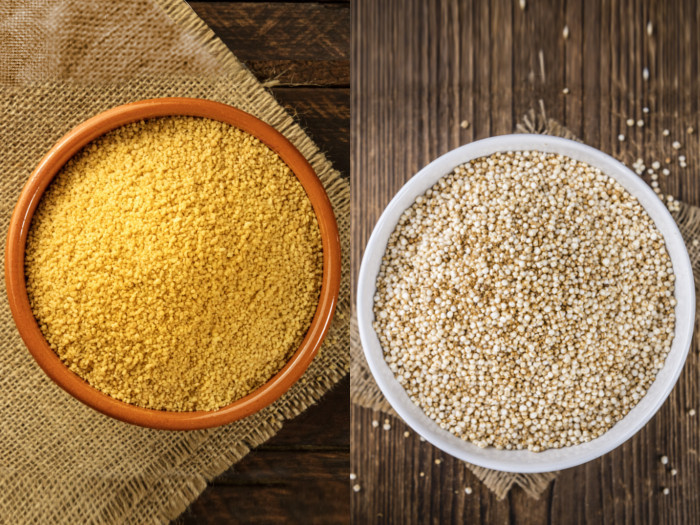In the ongoing debate of couscous vs quinoa, it can be difficult to know which to choose, but there are certain differences between these two grains.
Couscous vs Quinoa
Choosing between couscous vs quinoa depends on what health benefits you want, and what recipes you are trying to prepare.
Couscous
- Couscous is made from semolina flour and has been an important part of the cultural preparation for thousands of years, particularly in North Africa. [1]
- Couscous is extremely high in gluten, due to being made from hard durum wheat. The semolina is rolled with water until it forms small pellets, and is then dried.
- A single cup of couscous contains roughly 6 grams of protein and about 175 calories. It also offers 6 grams of protein and a low level of fat, notably less than quinoa. [2]
- In terms of how it is used, couscous is often used as a replacement for rice, but due to its light consistency, it can also be a base for salads, breakfast cereals, and even in place of certain kinds of pasta.

Both couscous and quinoa can be used as a base for salads or as a side dish. Photo Credit: Shutterstock
Quinoa
- Quinoa is the gluten-free seed of the goosefoot plant and has become much more popular in recent years due to the rise of celiac disease diagnosis. [3]
- Quinoa is rich in critical nutrients, offering nearly 4o grams of carbohydrates per cup, as well as 8 grams of protein and 5 grams of fiber.
- Unlike other types of rice or pasta, quinoa is rather fast-cooking, only requiring 10-15 minutes to prepare.
Which is Healthier?
Quinoa and couscous can be used interchangeably in dishes as both are small-grained and have a light nutty flavor. However, cooking times and directions vary according to recipes. But quinoa seems to be the more nutritious choice because:
- Quinoa is praised for being a complete protein, meaning that it contains all the amino acids necessary for protein synthesis in the body. For this reason, quinoa is generally considered a better food source for vegetarians and vegans than couscous. [4]
- Quinoa is beneficial for people who are looking for a nutrient-dense, gluten-free option.
- Quinoa has double the amount of fiber as compared to couscous and can keep you feeling full longer.
